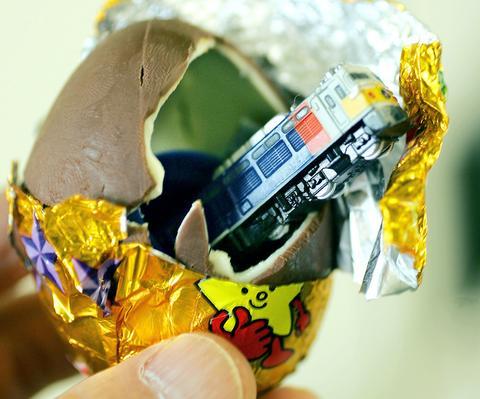The idea seemed a good one: Go one better than bubble-gum cards and buried cereal treasures and offer high-quality collectible action figures, toy-model kits and other toys to sell snacks.
Japan's confectioners had visions of profits ballooning when they hit on this marketing strategy, hoping to attract not only kids but their parents, too.
Naoko Takayama was among the enthusiastic collectors lured by the gimmick.

PHOTO: REUTERS
The 34-year-old part-time worker has spent around US$9,000 in the past three years to collect 2,200 parakeets -- a thumb-sized plastic prize packed in Choco-Egg, an egg-shaped hollow chocolate made by unlisted confectioner Furuta Seika.
"Now my room is full of parakeets, just like [Alfred] Hitchcock's movie The Birds," Takayama said.
But the initial boom that created an adult snack market has taken an unforeseen turn, forcing confectioners like Ezaki Glico Co, among the industry's leaders, to rethink their strategies.
"The market, unpredictably, became only for avid adult collectors and we are finding it difficult to attract general shoppers," said Glico spokesman Tsuyoshi Kiriishi.
"We need to make products that appeal to general consumers to step ahead of our rivals in the competitive snack market," Kiriishi said.
The idea for the toy-and-snack boxes, called shokugan in Japanese, came from Fererro Japan Ltd, the Japanese unit of Italy's Fererro Group, which put a chocolate variation of the boxes on Japan's store shelves in 1998.
Japanese companies followed suit, tying up with popular plastic model maker Kaiyodo, to include toys from air planes and animals to "British Museum Collection" pieces at prices ranging from ?150 (YS$1.37) to about ?500, against an average price range of about ?100 to ?200 for general sweets.
Shokugan became a hit, especially among males in the their 30s and 40s, with the market growing to ?60 billion in 2002, up 40 percent from 1998, according to data from Glico.
But while collectors were pleased, general consumers grew disgruntled with the quality and volume of the boxes that included only a few pieces of tiny biscuits or candies.
Collectors also lost some of their enthusiasm as the market became inundated with various items, and makers' moves to release higher quality toys started lifting shokugan prices.
After peaking in 2002, the shokugan market shrunk to ?57 billion last year -- accounting for only 2.6 percent of the ?2.204 trillion snack market, excluding cakes -- and is expected to fall to ?55 billion this year as the market becomes more saturated and collectors spend less.
"I think the figures became a collectors' thing and I was totally into it ... but now that I've got all the ones I wanted, I'm more selective about spending," Takayama said.
Japan's confectioners have also seen profits melt as average spending by households on snacks fell to ?76,739 a year last year, down 0.4 percent from 2002 and off 1.1 percent from 2001.
The general snack market has also shrunk, dropping over three percent on a retail basis last year from ?2.274 trillion in 2000, as consumers have become more health-conscious, according to data by the All Nippon Kashi Association.
"It's a competitive market ... and shokugan is neither the solution nor a life-saver for companies," said Credit Suisse First Boston analyst Yukiko Oshima.
Glico says it is trying to beef up sales of growth products such as dental-friendly chewing gum, instead of pouring more money into shokugan.
The company posted a 2.9 percent rise in group net profit in the past business year with poor sales of its mainstay "Pocky" snacks offsetting bubble gum sales. The company said sales of shokugan accounted for about 5 percent of its total revenues.
Competition is also heating up.
Japan's largest toy maker, Bandai Co, is gearing up to increase its presence in the general snack business.
Bandai raised its stake in financially troubled Tohato Inc to 37.7 percent last year from 27.7 percent and is considering taking full control of Tohato within a few years to strengthen its snack business, said Yusuke Fukuda, general manager at Bandai's candy toy department.

US PUBLICATION: The results indicated a change in attitude after a 2023 survey showed 55 percent supported full-scale war to achieve unification, the report said More than half of Chinese were against the use of force to unify with Taiwan under any circumstances, a survey conducted by the Atlanta, Georgia-based Carter Center and Emory University found. The survey results, which were released on Wednesday in a report titled “Sovereignty, Security, & US-China Relations: Chinese Public Opinion,” showed that 55.1 percent of respondents agreed or somewhat agreed that “the Taiwan problem should not be resolved using force under any circumstances,” while 24.5 percent “strongly” or “somewhat” disagreed with the statement. The results indicated a change in attitude after a survey published in “Assessing Public Support for (Non)Peaceful Unification

The CIA has a message for Chinese government officials worried about their place in Chinese President Xi Jinping’s (習近平) government: Come work with us. The agency released two Mandarin-language videos on social media on Thursday inviting disgruntled officials to contact the CIA. The recruitment videos posted on YouTube and X racked up more than 5 million views combined in their first day. The outreach comes as CIA Director John Ratcliffe has vowed to boost the agency’s use of intelligence from human sources and its focus on China, which has recently targeted US officials with its own espionage operations. The videos are “aimed at

‘MISGUIDED EDICT’: Two US representatives warned that Somalia’s passport move could result in severe retaliatory consequences and urged it to reverse its decision Minister of Foreign Affairs Lin Chia-lung (林佳龍) has ordered that a special project be launched to counter China’s “legal warfare” distorting UN Resolution 2758, a foreign affairs official said yesterday. Somalia’s Civil Aviation Authority on Wednesday cited UN Resolution 2758 and Mogadishu’s compliance with the “one China” principle as it banned people from entering or transiting in the African nation using Taiwanese passports or other Taiwanese travel documents. The International Air Transport Association’s system shows that Taiwanese passport holders cannot enter Somalia or transit there. The Ministry of Foreign Affairs (MOFA) protested the move and warned Taiwanese against traveling to Somalia or Somaliland

SECURITY: Grassroots civil servants would only need to disclose their travel, while those who have access to classified information would be subject to stricter regulations The government is considering requiring legislators and elected officials to obtain prior approval before traveling to China to prevent Chinese infiltration, an official familiar with national security said yesterday. President William Lai (賴清德) in March announced 17 measures to counter China’s growing infiltration efforts, including requiring all civil servants to make trips to China more transparent so they can be held publicly accountable. The official said that the government is considering amending the Act Governing Relations Between the People of the Taiwan Area and Mainland Area (臺灣地區與大陸地區人民關係條例) to require all civil servants to follow strict regulations before traveling to China.